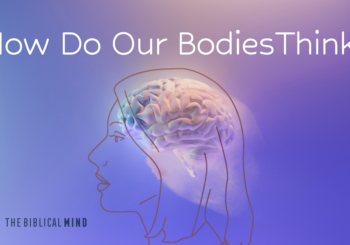Are You Bible-Literate? How About Bible-Fluent? These Terms, Explained
At the Center for Hebraic Thought and in our magazine, The Biblical Mind, we often use the terms Bible literacy and Bible fluency. And we’ve started using these terms more because we’ve realized that lack of Bible literacy and fluency is widespread in the Western church. If you read the Bible regularly, you might think that this article isn’t for you. We want to challenge you to reconsider that belief.
Enjoying this article? Read more from The Biblical Mind.
For Christians reading this, chances are that they don’t know the Bible that well, even if they attend church. We’ve learned this from statistics and from years of experience working in classrooms and churches. The reasons may include:
- Many Christians don’t read the Bible outside of church.
- Many Christians don’t study the Bible with other Bible-literate people.
- Many Christians only read the Bible in short snippets—a few verses or maybe a chapter at a time, and never a whole book in one or two sittings.
- Many Christians never or rarely read the Old Testament, especially outside of Psalms.
- Many Christians don’t seriously wrestle with passages they don’t understand, such as by using good Bible study resources.
- Rather than working to practice biblical teaching, some Christians believe the Bible has an almost magical power to transform their lives automatically, even if they don’t understand the text that well.
There are other possible reasons, but the problem is not that the Bible is only accessible to pastors and scholars. We believe anyone can comprehend the Bible, but also that everyone needs guidance.
If you haven’t already, take our Bible literacy quiz to help you assess your current level of literacy. You might also try Jen Wilkin’s quiz if you want more data for your assessment.
For reference, numerous articles, talks, and surveys on the topic exist, such as this article from Biola Magazine; this one, this one, and this one from Christianity Today; this one from The Gospel Coalition; this one in Modern Reformation; and our podcast episode with Jen Wilkin.
Christians should pursue Bible literacy and fluency, first, to know what God is like—what He loves and hates, and how He acts in our world—and second, to become the kind of people, both individually and communally, who are reliably formed according to God’s character. In short, we need to be truly confident that we are living as God’s family, and no longer as His enemies. Finally, we believe a lack of Bible literacy and fluency underlies many problems and oversights in the Western church.
Let’s take a look at what we mean by Bible literacy and Bible fluency and why they matter.
Bible Literacy and Fluency Start with Careful, Curious Reading
Think of the last book you read. How did you read it?
That might seem like an odd question, but bear with me.
By how did you read it, I mean: Did you devour the book in one sitting? Did you read it a few pages at a time over many months, perhaps during your 20-minute commute on public transit? Did you dog-ear pages and annotate in the margins? Did you write a paper about it? Did you just skim it?
Now, think. If the book had a narrative:
- Who were the memorable characters?
- What were the main events and themes?
- What were the central conflicts, and how were they resolved?
If it was a non-narrative book:
- What was the central argument?
- What were the main supporting arguments?
- What were the key conclusions?
Roughly gauge how well you can answer these questions, and how your reading method may have helped or hindered your understanding.
The Bible is a book that you might have read recently—though if you’re like 80% of Americans, you’ve never read the whole thing. And if you’re like most churchgoers, who are more likely to read the Bible regularly, you probably only read a little bit at a time. Which is kind of like reading snippets of a novel while riding public transit, actually. (So, probably not ideal for retention or comprehension.)
What’s more, biblical texts are separated from modern American life by location, languages, culture, and time, and all the implications of that historical distance. Maybe you know Psalm 23, but do you know what life was like for shepherds in Iron Age Israel? That kind of historical context can affect our ability to unpack rich biblical metaphors, to take just one example of how modern readers might miss the meanings of a text. Psalm 23 also connects across Scripture to a shepherd motif with Abel, Abraham, Moses, David, Zechariah, Ezekiel, John 10, 1 Peter 5 . . . you get the idea.
The good news is that curious and careful reading can lead you to the right questions, which can then lead you to the tools you need to understand Scripture. We’re less focused on whether you read your Bible every single day, and more interested in how you read it in general, what you know about it, and how you apply it. That’s where Bible literacy and Bible fluency take shape.
What Is Bible Literacy?
In the last section, look back at the questions in the bulleted lists. If I asked you those questions about the Bible (yes, the whole Bible), how detailed and accurate an answer could you provide? Your ability to answer those kinds of questions is what we mean by “Bible literacy.”
Bible literacy is thorough familiarity with the key narratives, people, order of events, and basic, clear themes throughout the whole Bible—yes, even the minor prophets.
If you didn’t score as well on our Bible literacy quiz as you expected, you might want to respond in one of the following ways (to which I can reply only very briefly here):
Why do I need to know whose servant Gehazi is? Isn’t that just trivia? I understand the Gospel, which is the most important thing.
The short answer is that the story of Gehazi is important to the story of Elisha, which is important to the story of 2 Kings, which is important to the story of the Old Testament, which is important to narrative of Scripture. There are also parallels in this story between Elisha and Jesus (can you spot them?). The Gospel doesn’t exist in isolation from the rest of the Bible. If you believe the Bible is divinely inspired, then no character appears by accident, and the actions of these characters teach us something about ourselves, our relationships, God, the broader world, or all of the above.
It’s kind of unrealistic to expect laypeople to know the Bible that well. It’s so long and some parts are bizarre. Will it really make a difference in my life to study, say, the book of Numbers?
First, instead of reading the Bible daily, set aside a few hours each week to study it carefully and curiously in larger chunks, noting your questions along the way. You might need to watch less TV, spend less time on social media, or be generally stricter about time management, but we think God’s Word is worth it.
Second, you don’t have to attend seminary, but you should treat all of Scripture as God’s Word and as a coherent body of thought. If you were studying one of Shakespeare’s plays, you wouldn’t be able to skip an act because you found it trickier to understand or less immediately interesting. Skipping an act would also partially or totally impair your ability to comprehend the rest of the play.
I don’t think I need to meet your standard of literacy to live a good Christian life and to correctly apply the most important biblical principles.
Our standard of literacy is about the same standard an English teacher would apply to your grasp of The Scarlet Letter. If you failed a test about that book, or wrote a poor essay about it, it’s not likely that you would be able to clearly state its most important themes and principles, let alone be shaped by them.
Again, we think the books of Scripture fit together into a coherent whole, with each informing and enriching the others. The more knowledge gaps you have for parts of the Bible, the more knowledge gaps you may have for the whole, and therefore, even for the parts you have read.
What Is Bible Fluency?
Bible Fluency is the (habituated) ability to faithfully extend biblical principles from their original contexts into our modern context in a potentially infinite number of ways.
So you can ask a question like, “What does the Bible say about smartphone usage?” but you’d have to start with knowledge of the issues that the biblical authors discussed in their historical context before you could extend those principles to a modern concern. In some cases, you might find that you were asking the wrong question.
Being Bible-fluent means that you can confidently identify and apply what the biblical authors say or would say about X important issue without proof-texting, overlooking the text’s basic literary elements, or otherwise misinterpreting the pertinent passages.
And it means that you can probably do so fairly well with just a bit of targeted re-reading and discussion. The relevant texts and their context won’t be alien to you, and you won’t have to rely on, say, half-remembered notes you took during a sermon that was already somewhat removed from the biblical text itself. Good sermons exemplify how to understand and apply Scripture, but they can’t substitute for your own habitual study and application of Scripture within a community of Bible-readers.
As you might have guessed, Bible fluency depends upon Bible literacy. It also requires reading Scripture as literature, which is actually necessary for being shaped by its teaching so that you can faithfully apply it.
For instance, many people have thought that the story of David and Goliath in 1 Samuel 17 centers on, in the words of VeggieTales, how “little guys can do big things, too.” Yet the structure of this narrative suggests otherwise.
To gain fluency in this story via literacy, we might think about it this way:
The conflict arises when Goliath challenges the Israelite army to send a man to fight him one-on-one. Goliath says that if he is defeated, the Philistine army will surrender, but if he prevails, the Israelite army must surrender. This challenge is daunting because the author describes Goliath as large and fearsome, and because Saul later describes him as an experienced warrior.
So far, so good. But now, notice the climax and resolution of the narrative. Just prior to the climax, David foreshadows the resolution when he says to Saul, “The Lord who delivered me from the paw of the lion and from the paw of the bear will deliver me from the hand of this Philistine” (1 Sam 17:37, ESV). At the climax, when David is about to hurl his stone at Goliath’s head, David says,
You come to me with a sword and with a spear and with a javelin, but I come to you in the name of the Lord of hosts, the God of the armies of Israel, whom you have defied. This day the LORD will deliver you into my hand, and I will strike you down and cut off your head . . . that all the earth may know that there is a God in Israel, and that all this assembly may know that the LORD saves not with sword and spear. For the battle is the LORD’s, and he will give you into our hand (emphasis added; 1 Sam 17:45–47, ESV).
This narrative, especially within the broader narrative of 1 Samuel, reveals itself to be primarily about God’s faithfulness in protecting Israel from her enemies. This event confirms a pattern we observe throughout the text and in David’s particular experience of God protecting him from wild animals. Following plot is fundamental to reading out of the text, and not into it.
Now that we have basic literacy in this story, what is the significance of being fluent in the story of David and Goliath? I certainly can’t draw out all of the story’s implications here, but I’ll just note: if you had thought the story was about how “little people can do big things, too,” you might be profoundly disappointed in the course of your life. You might have adopted this misguided moral as your personal mantra, believing it to be divinely inspired wisdom. When you discover that you cannot do the big things you had planned to do because you failed out of college or developed debilitating mental illness or were sidelined by a global pandemic, you might begin to doubt this story’s relevance or truth. And by viewing oneself as the little underdog, one might overlook the more vulnerable in their community.
To start becoming literate and fluent in this story and the rest of Scripture so that you can be shaped by its teaching, first and foremost, read the Bible. Read it in large chunks at regular intervals, trying to identify the important plot elements or the structure of the argument. Write down your questions and bring them to church or to your small group. Finally, check out more resources:
Subscribe now to receive periodic updates from the CHT.





